Written by: Melissa Shaw, Primary Curriculum Coordinator & Mira Edmonds, Garden CCA Leader and YCIS Parent.
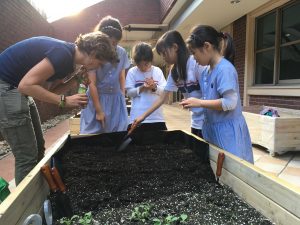 Last year, our Primary students were introduced to the 17 Global Goals developed by the United Nations. This year, we have continued to explore ways to expand their understanding of the various challenges that we face as a global community, and most importantly, what they can do within their school community to start making a difference.
Last year, our Primary students were introduced to the 17 Global Goals developed by the United Nations. This year, we have continued to explore ways to expand their understanding of the various challenges that we face as a global community, and most importantly, what they can do within their school community to start making a difference.
A new initiative that we have been excited to begin is our Learning Garden Project. The impetus for this project is the need to educate our children about the importance of living a healthy, sustainable lifestyle. Mira Edmonds, a member of our school’s Parents of Pudong (POP), and environmental enthusiast, initiated the idea and has been working alongside campus leaders to lay the foundations for this project.
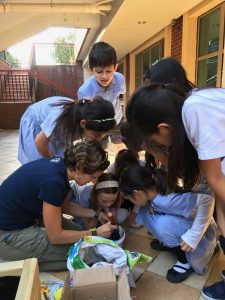 Our Primary Science Curriculum already provides opportunities for children to learn about topics such as healthy living and the natural environment. The Learning Garden builds on this focus and “…is not only a rich environment for learning in and of itself, but […] also serves as an introduction to a much broader understanding of the natural world.” (Bucklin-Sporer & Pringle, 2010). Our students live in ultra-urban Shanghai and rarely get a chance to see, much less participate in, the process of how food reaches their plates. In the Learning Garden, our students have the opportunity to engage in the whole cycle, from planting seeds, to watering and nurturing the young plants, to harvesting the mature plants and preparing them to eat. Our hope is that this experience will foster a better appreciation of and interest in caring for the environment and of living a healthy life.
Our Primary Science Curriculum already provides opportunities for children to learn about topics such as healthy living and the natural environment. The Learning Garden builds on this focus and “…is not only a rich environment for learning in and of itself, but […] also serves as an introduction to a much broader understanding of the natural world.” (Bucklin-Sporer & Pringle, 2010). Our students live in ultra-urban Shanghai and rarely get a chance to see, much less participate in, the process of how food reaches their plates. In the Learning Garden, our students have the opportunity to engage in the whole cycle, from planting seeds, to watering and nurturing the young plants, to harvesting the mature plants and preparing them to eat. Our hope is that this experience will foster a better appreciation of and interest in caring for the environment and of living a healthy life.
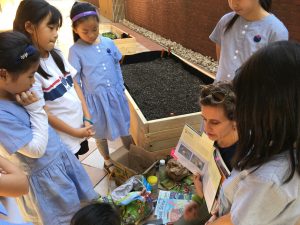 This semester, Mira has led the Gardening Co-Curricular Activity (CCA), with a group of students from Years 3-5. They have already planted a variety of vegetables, which the students have been excited to watch sprout and grow. They have learned about the plant lifecycle and the different parts of plants that we eat, as well as comparing different types of seeds. They are working on literacy skills through keeping a journal, and enjoyed the tactile experience of making vegetable prints. As the semester progresses, they will also learn how compost from our own kitchen scraps can help their plants to grow (with a little help from some red wriggler worms!); about the role of bees as pollinators and the threats that environmental degradation poses to the bees and thus to global food production; and the impact that our urban activities have on water quality. It has been great to see the students excited to learn about these important concepts in both the indoor classroom and the outdoor classroom of the garden. Having already enthusiastically munched on some stems (celery), fruits (sweet peppers), and roots (carrots), the students are looking forward to feasting at the end of semester on the vegetables that they grew with their very own hands.
This semester, Mira has led the Gardening Co-Curricular Activity (CCA), with a group of students from Years 3-5. They have already planted a variety of vegetables, which the students have been excited to watch sprout and grow. They have learned about the plant lifecycle and the different parts of plants that we eat, as well as comparing different types of seeds. They are working on literacy skills through keeping a journal, and enjoyed the tactile experience of making vegetable prints. As the semester progresses, they will also learn how compost from our own kitchen scraps can help their plants to grow (with a little help from some red wriggler worms!); about the role of bees as pollinators and the threats that environmental degradation poses to the bees and thus to global food production; and the impact that our urban activities have on water quality. It has been great to see the students excited to learn about these important concepts in both the indoor classroom and the outdoor classroom of the garden. Having already enthusiastically munched on some stems (celery), fruits (sweet peppers), and roots (carrots), the students are looking forward to feasting at the end of semester on the vegetables that they grew with their very own hands.
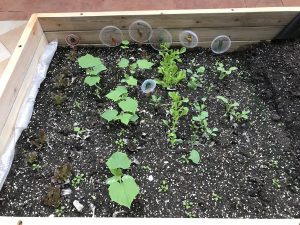
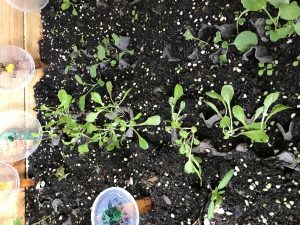
Year levels are excited to explore opportunities to integrate the school garden into all areas of the curriculum, not only in Science but also Mathematics and English. It is an opportunity to provide rich hands-on learning experiences that cannot always be captured in the classroom, and provides a better context for what the children are learning. We look forward to giving everyone the opportunity to work within and explore the garden. We hope that it becomes a successful project that we can build upon and that will generate connections with organisations around our community.